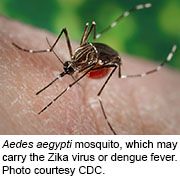
Scientists have some interesting news about Zika: You’re unlikely to get the virus from kissing or sharing utensils with someone.
A new study with monkeys suggests that Zika doesn’t appear to be transmitted through saliva.
“If passing the virus by casual contact were easy, I think we would see a lot more of what we would call secondary transmission in a place like the United States,” said lead researcher Tom Friedrich, from the School of Veterinary Medicine at the University of Wisconsin-Madison.
“But we’re not seeing clinically apparent spread of Zika throughout the continental U.S. without the presence of the mosquitoes that carry the virus, and our study helps to put into context some of the transmission risk,” he added in a university news release.
Mosquitoes are the main cause of Zika infection in people. After infection, the virus remains in blood and saliva for a few weeks. And it remains in bodily fluids like breast milk for weeks and semen for months, the researchers said.
Zika can be spread from person to person through sexual intercourse, but it’s been unclear whether the saliva of an infected person poses a threat to others.
The researchers conducted experiments with monkeys and concluded that casual saliva contact such as kissing or sharing eating utensils is not enough for Zika to move from one host to another.
But it’s important to note that studies done in animals often don’t produce similar results in humans.
The make-up of saliva may be the main reason why Zika can’t move from one person to another, the researchers said.
Dawn Dudley, a scientist in UW-Madison’s School of Medicine and Public Health, noted that “saliva is viscous (thick and sticky] stuff. That hinders the ability of the virus to move and get to cells that they could infect.”
Saliva just doesn’t provide a good environment for the Zika virus, the researchers said.
Most people only suffer mild symptoms when infected with Zika, but the virus has been linked to catastrophic birth defects in babies whose mothers were infected during pregnancy. The most common of these defects is microcephaly, where the baby’s brain is small and underdeveloped.
The study was published Aug. 1 in the journal Nature Communications.
More information
The U.S. Centers for Disease Control and Prevention has more on Zika.
Source: HealthDay

Leave a Reply